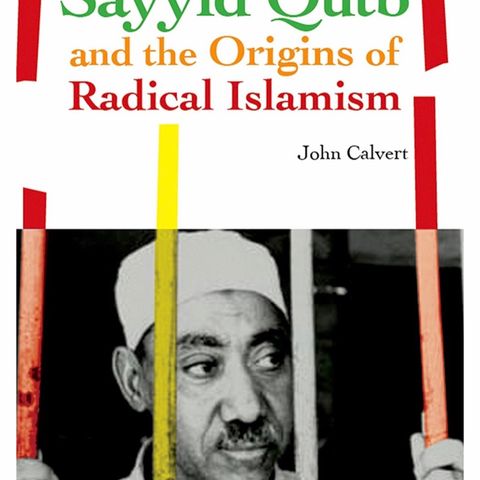Who was Sayyed Qutb? with Dr. John Calvert
Feb 28, 2017 ·
22m 39s

Download and listen anywhere
Download your favorite episodes and enjoy them, wherever you are! Sign up or log in now to access offline listening.
Chapters
Description
Sayyid Qutb (1906-1966) was an influential Egyptian ideologue credited with establishing the theoretical basis for radical Islamism in the post colonial Sunni Muslim world. Lacking a pure understanding of the...
show more
Sayyid Qutb (1906-1966) was an influential Egyptian ideologue credited with establishing the theoretical basis for radical Islamism in the post colonial Sunni Muslim world. Lacking a pure understanding of the leader's life and work, the popular media has conflated Qutb's moral purpose with the aims of bin Laden and al-Qaeda. He is often portrayed as a terrorist, Islamo-Fascist, and advocate of murder. This book rescues Qutb from misrepresentation, tracing the evolution of his thought within the context of his time. An expert on social protest and political resistance in the modern Middle East, as well as Egyptian nationalism, John Calvert recounts Qutb's life from the small village in which he was raised to his execution at the behest of Abd al-Nasser's regime. His study remains sensitive to the cultural, political, social, and economic circumstances that shaped Qutb's thought-major developments that composed one of the most eventful periods in Egyptian history. These years witnessed the full flush of Britain's tutelary regime, the advent of Egyptian nationalism, and the political hegemony of the Free Officers. Qutb rubbed shoulders with Taha Husayn, Naguib Mahfouz, and Abd al-Nasser himself, though his Islamism originally had little to do with religion. Only in response to his harrowing experience in prison did Qutb come to regard Islam and kufr (infidelity) as oppositional, antithetical, and therefore mutually exclusive. Calvert shows how Qutb repackaged and reformulated the Islamic heritage to pose a challenge to authority, including those who claimed (falsely, he believed) to be Muslim.
Review
"This rich and carefully researched biography sets Qutb for the first time in his Egyptian context, rescuing him from caricature without whitewashing his radicalism. It is no small achievement."--The Economist
"In one of the first serious English-language biographices of Qutb, Calvert puts this often misunderstood figure into his historical context, situating Qutb within the turbulent intellectual and political flow of Egyptian and Arab history. He expertly shows the development of Qutb's thinking, from literary critic to Islamist, and powerfully details the impact of the repression and torture carried out by the regime of Gamal Abdel Nasser on his turn towards the stark, radical doctrines which have shaped generations of Islamist radicals. Fascinating details emerge in this book. . . . The Qutb which emerges from Calvert's even-handed history is far more complex and interesting than the caricature of him which dominates popular understanding. Anyone interested in the evolution of Islamism in the 20th century should read it."--Atlantic Monthly
"The best biographies balance the person, the person's achievements, and the environment in which that person worked. This one of Sayyid Qutb (1906-66), considered by both friends and foes to be a founding father of radical Sunni Islamic thought, does just that. Calvert presents a portrait of Qutb worthy of a psychobiography, without the excesses of the genre."--Foreign Affairs
About the Author
John Calvert is Associate Professor of History at Creighton University, USA. His research focuses on social protest and political resistance movements in the modern Middle East; Egyptian nationalism; and the ideological origins of Al Qaeda. He is co-editor and translator of Sayyid Qutb's A Child from the Village.
show less
Review
"This rich and carefully researched biography sets Qutb for the first time in his Egyptian context, rescuing him from caricature without whitewashing his radicalism. It is no small achievement."--The Economist
"In one of the first serious English-language biographices of Qutb, Calvert puts this often misunderstood figure into his historical context, situating Qutb within the turbulent intellectual and political flow of Egyptian and Arab history. He expertly shows the development of Qutb's thinking, from literary critic to Islamist, and powerfully details the impact of the repression and torture carried out by the regime of Gamal Abdel Nasser on his turn towards the stark, radical doctrines which have shaped generations of Islamist radicals. Fascinating details emerge in this book. . . . The Qutb which emerges from Calvert's even-handed history is far more complex and interesting than the caricature of him which dominates popular understanding. Anyone interested in the evolution of Islamism in the 20th century should read it."--Atlantic Monthly
"The best biographies balance the person, the person's achievements, and the environment in which that person worked. This one of Sayyid Qutb (1906-66), considered by both friends and foes to be a founding father of radical Sunni Islamic thought, does just that. Calvert presents a portrait of Qutb worthy of a psychobiography, without the excesses of the genre."--Foreign Affairs
About the Author
John Calvert is Associate Professor of History at Creighton University, USA. His research focuses on social protest and political resistance movements in the modern Middle East; Egyptian nationalism; and the ideological origins of Al Qaeda. He is co-editor and translator of Sayyid Qutb's A Child from the Village.
Information
| Author | Circle Of Insight Productions |
| Organization | Circle Of Insight Productions |
| Website | - |
| Tags |
Copyright 2024 - Spreaker Inc. an iHeartMedia Company
